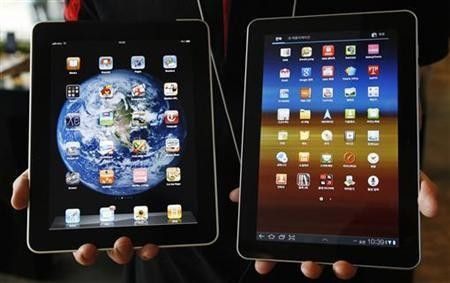T-Mobile and Verizon Weigh In On Apple-Samsung Patent Battle

On Wednesday, T-Mobile joined Verizon in filing an amicus brief in the most recently contested Apple vs. Samsung case over the design of the Galaxy line of tablet computers and phones. The original suit was filed in April in Northern California and covered seven utility patents, three design patents, several iOS app icons, and a number of trade dress designs for the iPhone, iPod Touch, and iPad, as well as the packaging for the Apple products.
Related actions have since been filed all over the world and have thus far resulted in injunctions against Samsung in Germany and the Netherlands, while a ruling on injunction proceedings underway in Australia is expected next week. Apple has filed a motion for preliminary injunction against making, using, offering to sell, or selling within the United States, or importing into the United States, the following recently released products: the Galaxy S 4G, Infuse 4G, and Droid Charge smartphones, and the Galaxy Tab 10.1 tablet computer.
If the motion, slated to be argued at an October 13th court date, is granted, it could spell trouble for the wireless carriers. In the brief filed Wednesday, T-Mobile contested that injunctions on sales of the Galaxy devices would harm T-Mobile as well as its customers. The company asserted that its profits for the upcoming 2011 holiday season will be highly dependent upon the availability of products such as the Galaxy Tab 10.1 and Galaxy S II. At this late date, T-Mobile could not find comparable replacement products for the 2011 holiday season. These investments cannot be recouped easily.
For its part, Verizon's argument is that banning the sale of Samsung's products would interfere with the carrier's launch of its new 4G LTE network. The brief, which the telephone giant filed on Monday, notes that the accused Samsung devices are among the few products that can access Verizon Wireless's next-generation high-speed network. The document went on to assert that the success of 4G LTE as a product depends on consumers having access to devices that can make use of that network.
Both briefs acknowledge the necessity of a fair hearing on any infringement that may have occurred and are careful to underscore their respect for the protection of intellectual property, but both also question the necessity of a preliminary injunction. The T-Mobile brief implores the court to consider whether the preliminary injunction is an unnecessarily drastic measure, citing two previous cases wherein the court comments on the far-ranging impact it can have.
However, a preliminary injunction is a drastic and extraordinary remedy that is not to be routinely granted. Intel Corp. v. ULSI Sys. Tech., Inc., 995 F.2d 1566, 1568 (Fed.Cir. 1993). When considering whether to issue an injunction, courts must pay particular regard for the public consequences in employing the extraordinary remedy of injunction. Weinberger v. Romero-Barcelo, 456 U.S. 305, 312 (1982).
If the injunction is granted, the carriers will certainly be affected, but it is unclear whether or not the court will take these issues into consideration in the absence of a formal complaint by either T-Mobile or Verizon against Apple on this matter.
© Copyright IBTimes 2024. All rights reserved.




















